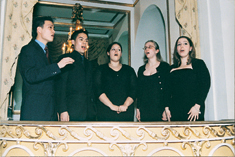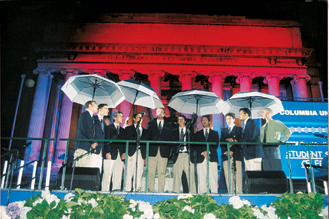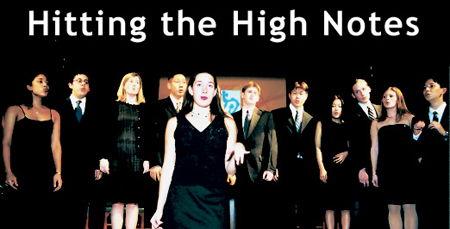|
|
 |
 |
 |
 |
|
FEATURE |
|||||||||||||||||||||||||||||||||||||||||||||||||||||||||||||
|
|
 |
| Notes & Keys leads
the audience in "Sans Souci" to formally conclude
the 2001 John Jay Aards Dinner in the Grand Ballroom of the
Plaza Hotel. PHOTO: EILEEN BARROSO |
And the fans come out of the woodwork. When members from Uptown Vocal, another prominent coed a cappella group, file into a residence hall lounge for a concert, they’re bigger than Bono, even though they’re covering his songs.
The rock star comparison isn’t ill-considered. A cappella concerts have been known to pack residence hall lounges, sometimes bringing out several hundred students. Groups may even have opening acts, usually groups from other schools.
At the Acappellooza Festival, held each spring, hundreds of students crowd into the lower level of Barnard’s McIntosh Hall to hear Columbia groups perform. One year, during an Orientation showcase, even Lerner Hall’s spacious Roone Arledge Auditorium was filled with first-years enjoying the tunes. “Student group talents greatly impress me, specifically the creativity and cooperation involved in a cappella,” says Rachel Flax ’03. “I enjoy music, so I think listening to people sing and create their own beats without instruments is pretty cool.”
“A cappella is a very versatile performance medium,” says Brian Overland ’04, business manager for the Kingsmen, by way of explaining the proliferation of a cappella groups. (The King’s Men, as the group was first known, was Columbia’s first a cappella group.) “It can be organized easily and quickly, and there seem to be a lot of people on campus who want to sing. And at a diverse campus such as Columbia, it only makes sense that we find a lot of groups with diverse memberships and diverse styles.”
As far as anyone can tell, a cappella came to Columbia in 1949 with the advent of the King’s Men, who performed at that year’s Homecoming at Baker Field. The ensemble went on to perform on The Ed Sullivan Show, Two for the Money and The Steve Allen Show. In 1962, before his storied career with Paul Simon, and long before inspiring Jubilation!, Art Garfunkel ’65 joined the King’s Men. When Woodstock rolled around in 1969, members of the King’s Men went and performed as Sha Na Na, the doo-wop revival band which gained nationwide popularity in the 1970s.
The Kingsmen, who now perform in matching red blazers and incorporate comedy into their routines, were reincarnated in 1982. A few years later, other a cappella groups followed, although the large growth came only in the last decade.
Tom Kitt ’96, a former Kingsmen music director who now is a professional musician on and off Broadway, says, “The Kingsmen was probably one of the best experiences I had in school. With the Kingsmen, I was doing things I just never thought I would do. At that time, making your own CD was not common, and we were going into the studio in my first year and recording. We had this unbelievable business manager, Mark Filstrup ’95, and he booked us all around Manhattan doing swank parties and performing on the QE2 every year so we could do our CDs and go on road trips to other colleges,” Kitt recalls, mentioning one trip to Georgetown when the ’smen, as they call themselves, were surprised to stroll on stage and find an audience of 1,000 students and family members.
Most groups practice at least six hours a week, but as Overland points out, “That’s just the beginning.” Another member of the Kingsmen, Brian Hansbury ’03, explains, “Road trips take a huge chunk out of weekends. The thought of getting any sort of work done is a lamentable pipe dream or a blessing, depending on what kind of student you are.”
|
|
 |
| The Kingsmen were among
many student groups that performed on Low Steps, despite the
rain, during the evening campus celebration at the October
inauguration of President Lee C. Bollinger. PHOTO: EILEEN BARROSO |
A cappella groups offer a great bonding experience, says Debbie Kaplan ’03, Uptown Vocal’s musical director. “[The] groups become so close-knit because they spend so much time together,” she says. “It’s a great community, social group and support net.” Many of the groups spend their out-of-practice hours together. Some have a “home” bar where they pass their weekend evenings, and then there are travel commitments, recording sessions, private party gigs and other activities, such as card games. Hector Rivera ’03, Clefhangers president, tells visitors to the Clefs’ website that he “can’t think of what his college years would have been like without them.
The performance groups are also social units, and some feel like the auditions to select new singers also are auditions to select new friends. Joshua Diamant ’04, music director of Non-Sequitor, the largest coed pop group on campus, says he “absolutely” felt that way. “A lot of the selection process is our impression of personality. If we think [he or she is] a big diva, or if [he or she] rubs us the wrong way, that person is not getting in. It’s worked pretty well. We all like each other,” he says.
But Rivera states that a group can still be professional about the selection process. “We first listen for voice talent and see how [the person] would be a match for the group. Unless we can’t see him or her meshing with us, the main concern is vocal ability,” he says. “There are people who we’d love to have in the group, but we can’t take them just because we love them.”
A former music director of Uptown Vocal, David Elson ’02E, says that a cappella groups are not much different from the athetics teams that spend so much time together at Baker Field and Levien Gym. “I’ve been to shows where hundreds of people sound like they’re rooting for the group, taking pride in it like it’s a sports team,” he says.
It’s not a bad comparison. A cappella singing has its championship competition, the International Championship of College A cappella, in which Uptown Vocal and the Clefhangers have reached the semifinals several times in recent years. The competition is divided into regions — just like an NCAA sports tournament — and the top groups from each region perform in an a cappella extravaganza at Lincoln Center every year. There’s no Heisman trophy, but singers seem happy to settle for a chance to sing in Avery Fisher Hall. And so do their audiences.
Adam B. Kushner '03, who is from New Orleans, edits the Columbia Political Review and writes frequently for the Miami Herald and The American Prospect.
| || | || |
CCT Home |
|
|
CCT Masthead |
